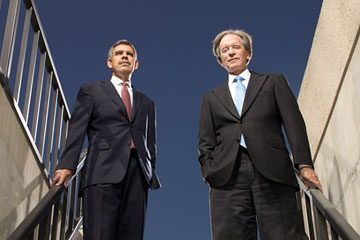
PIMCO's Mohamed El-Erian and Bill Gross.
(5 of 6)
Although they sound like Fed bashers, Gross and El-Erian blame politicians rather than central bankers for our woes. At least the Fed stuck a finger in the dike. The politicians stuck their thumbs elsewhere. Gross, a Republican who voted for Obama in 2008 and again this year mainly because he believes the President's stance on taxes is fairer (El-Erian is a Democrat), says, "Neither party really seems to understand that credit as a fuel for capitalism is basically exhausted. We're running on a hybrid now, as opposed to an eight-cylinder Chevrolet Impala like in the late 1960s."
The two do not see cutting tax rates a few percentage points or rolling back regulation as a solution. Gross believes that the last time supply-side economics worked to stimulate the economy was in the 1970s, when taxes were being cut from much higher rates. Nor should we expect a manufacturing renaissance, the Democrats' panacea, to spur a recovery when our major export markets are suffering.
But while they don't favor simple tax cuts, they believe inequality is the biggest economic headwind out there. After all, how can you have a sustainable recovery in an economy that's 70% fueled by consumer spending when 90% of the income gains since the recovery began have accrued to the top 1%? "Over the last several decades, companies have taken profits at the expense of individuals," says Gross. "A lot of people aren't being paid enough to spend."
Personal income is at least one issue that we can address--unlike, say, the euro-zone crisis, the slowdown in China or turmoil in the Middle East. Gross and El-Erian, who are solidly in the 0.1%, put tax reform tops on the to-do list. And both subscribe to the Warren Buffett school of taxes--that going from a 35% top tax rate to 39.6% wouldn't drive entrepreneurs abroad and that continued bifurcation in the U.S. workforce means the rich will need to do more for the team.
There will be some moderating forces. Productivity increases from things like mobile technology and the shale-gas boom could create jobs and make it cheaper to do business in the U.S. But the new normal will simply continue to be so disruptive in the short term, say the oracles at PIMCO, that wealth redistribution via tax reform is a must for creating a society that's socially cohesive enough to weather several more years of slow growth. "There should be tax reform where the wealthy pay more and corporations pay more but we end up with a more efficient system," Gross says. That system, he adds, should be devoid of tax breaks that just put money in rich people's pockets but include ones that encourage real investment.
Beyond that, the pair's prescriptions are very much a page out of the Simpson-Bowles playbook: medium- and long-term entitlement cuts to restore the U.S.'s creditworthiness and prepare for the day when interest rates (and costs on our debt) will rise. And in the shorter term, it's all about anything that can create real economic growth and jobs--an infrastructure bank, an FDR-style big dig, major investment in education, and labor-force retraining, particularly for younger people. "Youth unemployment is becoming an epidemic," says El-Erian. "This is the first generation that's seriously at risk of doing less well than their parents."
Making 2% Growth Pay Off
